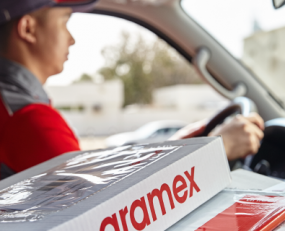
Dubai-based logistics provider Aramex is implementing a new operating model to better position itself for growth opportunities in the years ahead. The company announced this week (7th September), that it would divide its operations between two newly formed segments, Aramex Express and Aramex Logistics. The new operating structure would, the company said, improve “customer service levels and operating efficiencies while capturing greater global market share within both the B2C and B2B customer segments.”
Aramex Express will provide domestic and international delivery solutions and “serve the B2C customer base including Shop & Ship, e-commerce, FMCG, SMEs and other customers needing innovative last-mile solutions”. The counterpart Aramex Logistics segment’s offer will include air, sea and land forwarding services as well as warehousing and distribution for a “B2B customer base across multiple industries including oil & gas, healthcare & pharmaceutical, aerospace, retail & fashion, amongst others.”
The new operating structure will reorient the company’s geographic posture too. Services from both Express and Logistics will be provided to eight regions – Americas; Europe; Sub-Saharan Africa; Middle East, North Africa and Turkey (MENAT); GCC; South Asia and North Asia; and Oceana. Explaining the rationale behind the changes, Othman Aljeda, Group CEO of Aramex, cited an Express operation that represented 70% of current revenues and an intention to grow the “express business by creating new trade lanes domestically and internationally, and scaling up ground operations to cater to growing customer demands, while continuing to invest in technology and automation.” The Logistics segment, which accounts for 28% of revenues currently, will see its network grown “aggressively” in core markets through investments in “specialized warehouses to cater for high potential verticals, and are also scaling up infrastructure beyond main cities to provide extensive coverage,” Alieda further stated.
The changes at Aramex reflect a shift many will have noticed in recent years, and one that has been accelerated by the Covid-19 pandemic – namely that e-commerce is an increasingly fundamental driver of logistics growth and one which demands an increasingly sophisticated and coherent end-to-end solution. Separating the operation from the company’s global air and sea forwarding business, and from its B2B operations, will potentially allow Aramex to offer a customer-centricity some, but not all, providers of e-commerce logistics have so far achieved. At 28% of total revenue, the new Logistics business perhaps faces some challenges. Group revenues of around €1.3bn mean the Logistics businesses’ contribution comes in at around €350-375m, meaning on a global basis it is a small player in a market where scale is ever more important at the top end. Might it make an attractive option for a consolidator looking for an attractive regional bolt-on?
Source: Transport Intelligence, 9 September 2021
Author: Nick Bailey